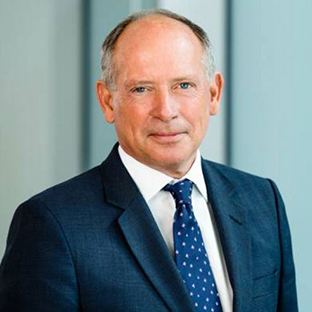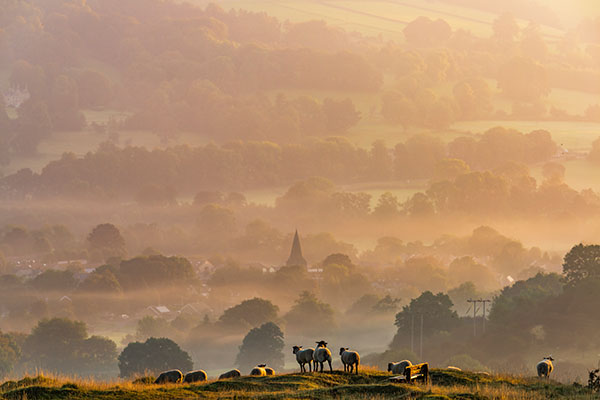The future of our farming sector, our food system and our countryside should not be left to professional experts and echo chambers.
Joined up government is an age-old challenge - but never more critical than now with Brexit.
Each minister wants to promote their department's ambitions, yet they depend on each other more than ever.
Michael Gove's consultation on the future of food and farming policy is a case in point, as the outcomes of Brexit for food and land use will reverberate across the economy.
The Secretary of State says he wants a thriving agriculture sector with much improved productivity. Yet he holds only a few of the cards to win that.
Take trade, of particular concern to a sector importing and exporting billions of pounds worth of fruit, vegetables, dairy and meat every year. The fate of food and agriculture depends more than anything else on trade agreements with the rest of the world, and which will be determined by departments beyond the realm of Defra.
The UK’s food and farming businesses can only be the successful food exporters that Gove is calling for, with the fair market access available to competitors in Europe and the rest of the world.
Or consider the urgent requirement to replace migrant labour in fields, factories and cafes. Skilling up a UK labour force and paying a living wage to agriculture and food sector workers requires action across the departments of Education, Business Energy and Industrial Strategy, Work and Pensions and Home Office, for starters, and takes considerable time to come to fruition. And the practical delivery of such strategies are dependent on the work done in the regions, in Local Enterprise Partnerships, and local authorities.
Likewise, for those dairy farmers urged to consider robots to replace herd managers and workers from Eastern Europe, it is competition policy that has shaped an industry and retail landscape that leaves them unable to make long term investments.
The same goes for Gove’s desire to preserve and enhance rural life and a healthy and beautiful countryside. How can this work without jarring with the needs for rural housing and development, as led by the Department for Housing, Communities and Local Government?
In short, decisions on trade, housing, immigration, health, work and pensions, energy, transport and industrial strategy, and by the Treasury, will make or break these ambitions that Gove has set out.
But - and here is the biggest challenge of all - addressing this will demand more than the usual efforts at Cabinet deal-making and civil service collaboration.
It will depend on a mandate from citizens to challenge deep-rooted expectations about what our food costs and what our countryside is for. It will depend on engaging the capacity for delivery that sits outside Westminster - in local government, in businesses around the country and across civic society.
Gove is inspiring and encouraging many when he talks about setting new global gold standards in sustainability, protecting natural capital and protecting the environment. The next step is to explore and test what this really means, to the businesses who have to make this work and to people in their communities around the country.
In discussing CAP reform, the phrase “public goods for public money” has become the new mantra. But how do we define public goods? And what do we count, in public money?
That may mean policy interventions from government, but that is not the only driver of change. We must recognise that this isn’t about simply changing regulations or government subsidies. The decisions made by citizens about what matters to them will also shape the future.
If preserving the countryside and protecting the quality of our food means that prices go up, is that acceptable to people? Conventional wisdom says no. But what if it cut other costs like water bills or lifted earnings, keeping down the net cost of living? Would that still be a political no go?
Conversely, what about better rural broadband and mobile networks and using church spires, which Gove has pledged, to much acclaim? If it brings large numbers of new people to live in the countryside, how far is that a change that existing residents really want?
Keeping open hard pressed rural services like schools, surgeries, shops, pubs and post offices is one thing. But when incomers start to have a say about those traditional activities that mean much to some rural residents - country sports like hunting and shooting - then tensions can arise.
Gove’s appetite for fresh thinking has been widely welcomed, and may inspire his Cabinet colleagues. Yet to see through policies that enable real improvements to our countryside and our lives, Government will need to inspire the British people - and listen to them - more broadly and more carefully than ever.
Too many citizens, across diverse rural landscapes and in our cities, feel disconnected from important policy questions. The debates often happen inside professional and technical silos, or, worse, shouted at each other from our communities of place or interests .
Gove’s consultation has proclaimed itself a once-in-a-generation opportunity to shape the future of English farming and the environment for farmers, landowners and food producers. Yet the repercussions will reverberate well beyond just this group. All of us should have a say in the provenance of our food; how we use our landscape, and the changing shape of our countryside and our rural communities.
The future of our farming sector, our food system and our countryside should not be left to professional experts and echo chambers. Our commission is reaching out to the citizens and communities across the UK and intent on hearing all voices.
Sir Ian Cheshire is chair of the RSA’s Food, Farming and Countryside Commission, as well as chair of Barclays UK. This article was first published by the Telegraph.
Related articles
-
Finding the road to renewal
Sue Pritchard
New poll by FFCC and the Food Foundation finds 85% of people want to see some of the personal or social changes they have experienced during Covid-19 continue afterwards, whilst just 9% want everything to go back to how it was before the pandemic.
-
Counting on recovery: collecting the data to inform policy post-crisis
Tom MacMillan
We’re starting to gather evidence on community responses to the pandemic, to help shape post-crisis policy. If you are too, let’s team up.
-
The Future is Here
Sue Pritchard
In a rapidly changing world, we need a stubborn optimism for the future.



Join the discussion
Comments
Please login to post a comment or reply
Don't have an account? Click here to register.
Thanks for your comments - I've passed your details onto our researchers touring the UK suggesting getting in touch. Best wishes. Tom from the FFCC team.
I live in a small dairy farming community in North Shropshire. I married into a dairy farming family. Many of our friends are farmers. We have in our village no bus service, no shop or post office and while broadband has recently arrived (finally) I see from the news that 5G is to be the next commercial battle ground and in a place where it could do much good I know now that we will be amongst the last to see the benefits. Micheal Gove has stuck a flag in the ground based on the "public money for public good" mantra but I believe that Sir Ian has a point; if there is a fair market for food then farmers will produce food. As it is there seems to be an underlying assumption that "cheap food" will come from elsewhere and home produced food will fill in the gaps but be more expensive. Food doesn't have to be cheap it simply has to be affordable and adopting an approach that places the value of food alongside the value we place on energy and infrastructure has to be part of the mix. We don't always appreciate it but we place a value on the quality and provenance of our food and I fear that these things will be swept away in order for cheap food to be part of some future trade deal and rural areas will become some vague notion of a countryside idyl currently residing in Mr Gove's head. I have no doubt that the agricultural robots are coming as is the inevitable consolidation of land into large farms. What I fear is the impact of corporate ownership of those large farms and the degeneration of the quality of rural life that goes along with it all within the umbrella of public good.
My chief concern is that, by emphasizing rural beauty, environmental protection, wildlife, etc, the UK may drift into a situation similar to the one we were in in 1939, when food production and the well being of the farming community had been neglected, too little food was being produced to support the human population, and it became difficult and dangerous to import enough food to make up the deficit.
David Wilman FRSA, Cambridge.
As an active farmer and the Chairman of Dawnfresh Seafoods Ltd, I would be very happy to give you some insights into the current problems and opportunities of the Food Industry. I am based in Scotland, therefore outside the area in which Michael Gove is involved in primarily, but he is in charge of all the negotiations that will happen outside UK. You need to hear a Scottish voice about Agriculture, Aquaculture and the Processing Industry. Our Trout is exported all round the world, with a negligible amount going to Europe. Alastair Salvesen CBE